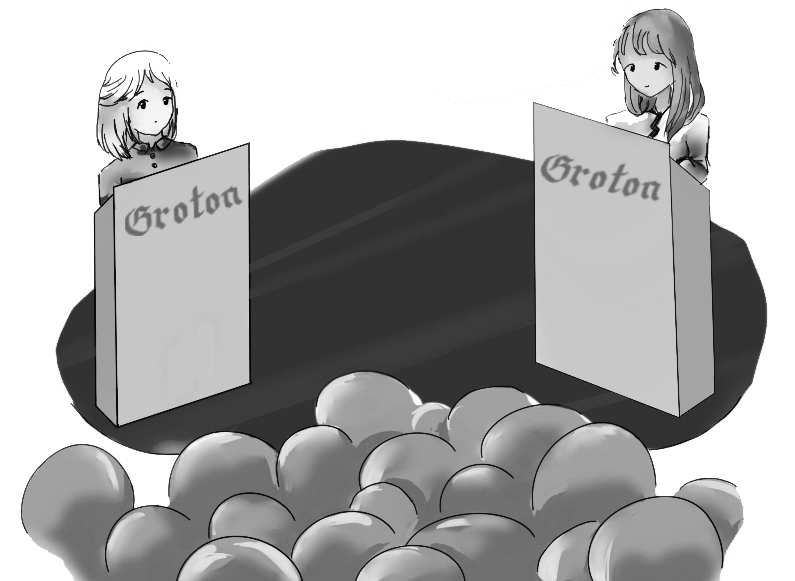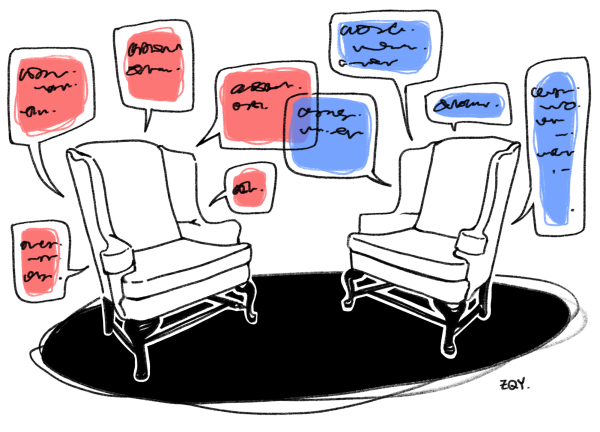Should Senior Prefects Campaign? Two Views.
Yes.
by Halle Livermore ’19
Imagine a presidential election in which campaigning is prohibited. Upon voting, you are provided a list of all eligible candidates, and from this list you must choose the leader of the free world. Your favorite actors are eligible, so you circle them and proceed to circle other names at random. The votes are counted and, from a shortened list of finalized candidates, you must rank four candidates. Then, a committee uses an undisclosed mechanism to determine the president.
As ridiculous as this method seems, it is precisely the system we follow to elect our senior and house prefects. Students are presented with lists of their entire form and, in the first round of voting, must circle four possible female candidates and four possible male candidates. Then, the four girls and boys with the most votes are put onto a ballot on which students must rank their choices for each gender. Math teacher Jonathan Choate uses a specifically devised formula to determine the students who will be awarded senior and house prefect positions.
In the preliminary round, selecting eight people can be challenging. Many resort to voting for friends, and sometimes even random peers. The thought behind Groton’s method is that leaders should stand out, but as I scanned the list of my form this spring, I did not feel inclined to vote for any particular person. Most Groton students exemplify the typical qualities associated with leadership at the high school level: we are capable of advocating for ourselves, and we are invested in the community, our studies, and extracurricular activities. Unaware of who wanted the position of senior or house prefect and why, I did not feel compelled to vote for any one person.
In order to create a community that constantly improves itself, we need leaders who are strong advocates, and campaigning can reveal a person’s ability to advocate. Campaigning need not mean flashy advertising through buttons or promises of organizing fun activities––it simply would give the candidate a platform to educate the voting population on how they would be an agent for positive change. Without this process, we often overlook passionate and deserving students.
At Groton, we are under an impression that our methods are superior, and preserving loyalty to tradition remains central to our character. At most public high schools in America, and even private schools like Phillips Exeter Academy, students campaign for roles such as president of the student council. However, at Groton we frown upon students even articulating an interest in becoming a prefect. How can we foster leaders if we shame people who express a desire to lead? It upsets me that we overlook so many qualified students out of a desire to preserve tradition.
We are no longer an all-boys’ school with a graduating class of 55, so why are we still using the same practice to elect our leaders? This method perpetuates a notion of Groton exceptionalism. If every other high school in the United States allows students to campaign, what makes us so special that we shouldn’t do the same? There is no value in preserving an antiquated method for the sake of being unique. Transitioning to a campaign-based election would ensure the most qualified advocates step into the role of senior prefect, and would be a positive step away from Groton’s exceptionalist attitude.
No.
by Katie Reveno ’20
At many schools, spring term marks class president hopefuls distributing pins and taping posters up on walls. Here at Groton, however, the senior and house prefect election process is markedly different––in fact, there is no campaigning at all. The idea is that at a small school like Groton, voters should already know which of their classmates are fit to be leaders. Though the current system comes with some problems, campaigning at a school as close-knit as Groton would be unnecessary.
One of the primary issues with divorcing campaigning from the voting process is that the system may not consider the level of candidate interest. If one candidate is willing to put more work into the role than another, the difference would normally manifest itself in the campaigning process. As the Groton election system stands, a candidate can be elected who doesn’t want the responsibility. However, this theoretical problem doesn’t become a real one, as students consider the positions an honor, and nominees who are truly disinterested can easily let their formmates and the administration know. Voters can also examine previous involvement to gauge the effort level that nominees would put in.
Some may also argue that an election process devoid of campaigning runs a greater risk of becoming a popularity contest. In actuality, the opposite is true. Campaigning often consists of rallying one’s friends to increase support by word of mouth. Thus, the greater number of friends one has, the more support a candidate is able to gain through the campaigning process. Campaigning of any nature leads to a bandwagon effect where students support candidates simply because their friends are. Without campaigning, voting can come down to an individual’s discretion and personal experiences with the candidates.
The current system makes sense, especially when one considers the size of the Groton community. With fewer than one hundred students in each form, if someone is truly not well known by their formmates when election time rolls around, they are probably not a good fit for senior prefect. As Kochoe Nikoi ’19, an incoming senior prefect, put it, “To campaign is to convince, and if by fifth form you still feel the need to convince your peers to elect you, then they most likely don’t know you as a person, or your character…. all of your past years at Groton sort of act as your campaign.”
Another important consideration against campaigning at Groton is the time commitment. In the midst of fifth form spring, candidates do not need the stress of creating campaigning materials and crafting speeches on top of APs and their already-demanding course loads. Campaigning would also require all other members of the form to listen to speeches and read candidates’ platforms in order to cast an informed vote, which would unnecessarily burden the fifth form.
In sum, the associated negatives of campaigning for senior and house prefect positions outweigh any benefits. While it can be tempting to look at other schools who employ campaigning in their student government elections and suggest that Groton do the same, Groton’s small size makes the process unnecessary. The current system of electing senior prefects has pulled many qualified candidates into the role, and there is little positive impact that would come of changing it.














